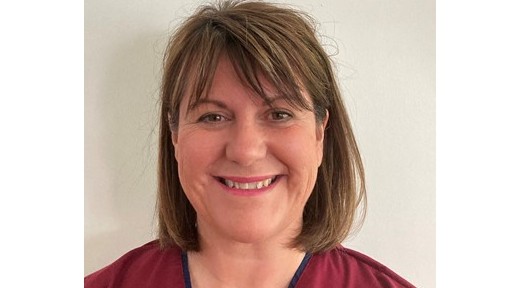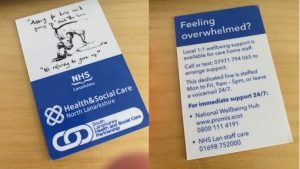Care Home Staff Wellbeing
Special focus on care home wellbeing group
Staff wellbeing has been in sharp focus in recent weeks and months.
While community, primary and acute teams have been a key focus of our messaging, local authority, the independent sector and NHS care homes are a vital audience – and part or our wider partnership – too.
The care home workforce has experienced unique and continued pressures during the pandemic – and targeted wellbeing support has been set out.
A series of focus articles on this page, looks at supports available for care home staff across Lanarkshire.
Questions and answers profiling the multi-agency care home wellbeing group
Questions answered by the group’s co-chairs;
Caroline Martin, senior nurse

Dr Susan Ross, consultant clinical psychologist

How did the wellbeing group come about?
The drive to deliver high quality care has been evident throughout the care home sector – despite the challenges brought about by Covid-19 and the many restrictions and measures that have been introduced.
In September last year, a number of staff working alongside Lanarkshire’s care homes decided to form a staff wellbeing group, aiming to understand the unique challenges this workforce were facing, and tailor supports that would be available to all care home staff, regardless or role or employer/owner.
Who is on the group?
The group is made up of representatives of from North and South Lanarkshire HSCPs, NHS Lanarkshire, Scottish Care and, most importantly, members of the front line care home workforce themselves. The aim is to ensure staff are supported, from simple wellbeing provision to those who require mental health assessment and intervention.
How has the work, and the aim, of the group been informed?
Care home staff completed a survey in September 2020 (around 500 responses) which helped us understand how they were doing, what supports they valued the most and, crucially, where the gaps were. We also try to keep a close ear to the ground.
Staff told us that the support they access and value the most is from each other. We aim to support them to continue to do that, sharing ideas and ensuring they have access to information and resources. It’s also important they know where to reach out to for help when it’s needed.
So what sort of things has the wellbeing group been doing?
First and foremost, our deepest sympathies and condolences are with all those who have lost loved ones to Covid-19. We also know the impact of Covid continues to be deeply felt by our colleagues working in the front line of care homes too.
We have a range of supports in place for care home staff if they need it. By way of a few examples:
- We heard that it could be challenging to know where to find information, so help and support information and signposting were shared. This was verbally, (at the weekly conference calls) and we wrote to managers to promote in-house wellbeing supports and establishing rest areas.
- We established a single point of contact telephone line for staff to seek signposting information about wellbeing and mental health support, which is 07971794065. The dedicated line is staffed Monday to Friday, 9am-5pm.
- We also provided every member of the care home workforce with a laminated card (with lovely Charlie Mackesy art) signposting to the dedicated line and other wellbeing and mental health information, including 24/7 support.

- We have created three short videos with Phil Smith, a clinical psychologist from NHS Lanarkshire, and Ally Cowan of Summerlee care home. They include an overview of what’s available, practical ways of supporting wellbeing by being there for each other and support channels over and above peer support.
- Members of the group also offer individual and team support to staff when this is needed – this is often a listening ear following difficult events, and guidance or suggestions for what supports might be most helpful to support staff through challenging times.
How important are the natural supports you mention in terms of staff supporting each other?
Crucially important. There often isn’t time to reach out to external supports – and we know staff want to look after themselves and each other.
We have established a peer support network, organised peer time for managers and encouraged the identification of in-house ‘Wellbeing Supporters’ and their training using the an online module on Psychological First Aid.
Do you have any examples of peer to peer support?
Yes. We’re proactively publicising some of this amazing work. One example that gained a lot of media attention was an artistic nurse who gave her care home colleagues a superhero-style boost – depicting them in an amazing caped-crusader gallery.
Wonder woman Lynn Bell, who works in Parksprings nursing home, Motherwell, has created caricatures of all of her co-workers – in full-flight and resplendent in flowing capes. Lynn says her painting has been inspired by of the collective spirit of the team.
We know how staff being there for each other has been – and is – very effective and powerful. Super-talented Lynn provided a very bright, and very brilliant, example of that in action.
How do care home staff contact the group?
It’s really important we keep a two-way dialogue with care home staff. If any member of the care home workforce would like to join the wellbeing group, or share your thoughts, please get in touch. We are keen to hear the things that are tricky for staff collectively and individually and to make sense of what they have faced in the past 16 months.
Please email us:
Care home staff are sharing examples of things that have made a difference and got them through – please let us know if you would like to share examples from your care home with your colleagues.
Carving some Time and Space for You
Read our tips on carving some time and space for you – and on how to switch off after a shift. The aim is to protect time off and, within that, give yourself permission to do things that keep you well and bring you joy.
Sleeping Better
Read our tips on how to get a good night’s rest (or day’s rest for those of you on nightshift).
Most of us have had nights where we cannot get a good night’s sleep, and given the current challenges, it is possible that your sleep may be affected.
When you are worried or stressed you might struggle to get to sleep, wake up in the night or have nightmares. This is because the survival parts of your brain are more active and reluctant to switch off. This is helpful at times when you need to stay awake to keep yourself safe, but not when you are exhausted.
Developing Self Compassion
To care well for others we also need to care well for ourselves. Read our tips and further reading on how to best look out for yourself.
Consider for a moment how we all accept the instruction before a flight to put on our own oxygen mask, before we help someone else with theirs. Self-care and self-compassion are based on the same principle.
Exercise
Read our tips and further reading on how to help your physical and mental wellbeing and the activities you can do to keep yourself motivated.
Anxiety
Most of us will have experienced feelings of anxiety at some point over the past year as a result of the effects of Covid-19 on our personal and working lives.
Read our helpful tips on managing anxiety.
Mindfulness
Mindfulness is a natural state that we have all experienced at some stage throughout our lives. We are more likely to experience this state of mindfulness when we are doing something that we enjoy doing at our leisure, without the pressure of time restraints.
Staying Connected
Spending time with people we like is good for our wellbeing. The pandemic has disrupted this and many of us are adapting and learning new ways of staying in touch with family and friends.


